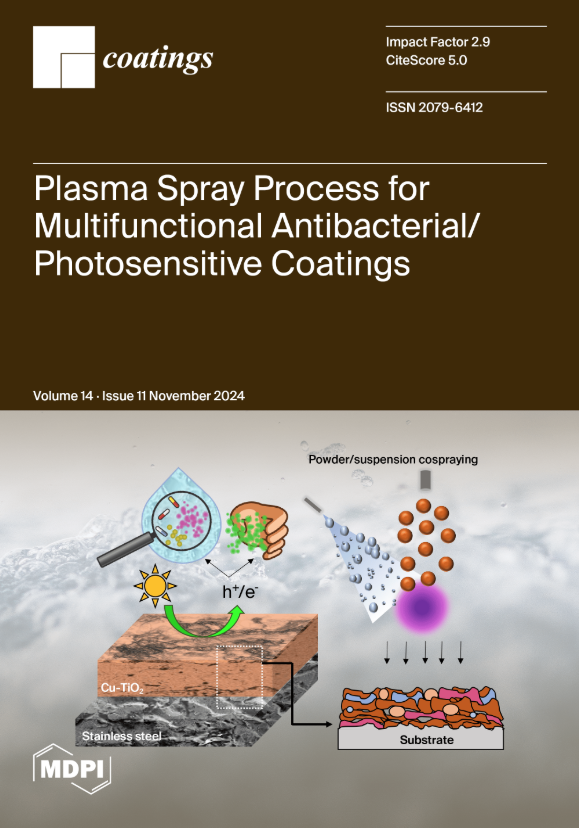用激光快速成型技术制造的 CoCrFeNiTix 高熵合金的微观结构与性能
IF 2.8
3区 材料科学
Q2 MATERIALS SCIENCE, COATINGS & FILMS
引用次数: 0
摘要
CoCrFeNi HEAs 具有较好的延展性,但强度和耐腐蚀性有待进一步提高,而深海作业用金属材料则要求具有优异的机械性能和极高的耐腐蚀性;然而,对 CoCrFeNi HEAs 在机械性能和耐腐蚀性之间的权衡研究较少。因此,本研究利用激光熔融沉积(LMD)技术制备了一系列 (CoCrFeNi)Tix (x = 0.2, 0.4, 0.6, 0.8, 1.0 at.%) HEA,并系统研究了 Ti 含量对合金微观结构、相组成、机械性能和电化学性能的影响。研究结果表明,随着钛含量的增加,合金逐渐从单一的面心立方(FCC)相转变为 FCC 和体心立方(BCC)双相结构。钛的加入使合金的微观结构从等轴形态转变为树枝状形态,并伴随着晶粒细化。能量色散光谱分析证实了钛在合金中的均匀分布。合金的硬度随着钛含量的增加而显著提高,当钛含量为 1.0 at.% 时,硬度达到 804.5 HV,是无钛合金的 4.13 倍。拉伸和压缩测试结果表明,Ti 含量为 0.4%的 (CoCrFeNi)Tix 合金具有最佳的整体机械性能。电化学测试结果表明,Ti 的添加有效地增强了合金的耐腐蚀性,其中含 Ti 0.4 at.% 的合金表现出最佳的耐腐蚀性。这项研究为设计高性能 CoCrFeNi 基 HEA 提供了坚实的理论和实验基础。本文章由计算机程序翻译,如有差异,请以英文原文为准。
Microstructure and Properties of CoCrFeNiTix High-Entropy Alloys Fabricated by Laser Additive Manufacturing
CoCrFeNi HEAs have better ductility, while the strength and corrosion resistance need to be further improved, while metal materials for deep-sea operations put forward the requirement of excellent mechanical properties and very high corrosion resistance; however, CoCrFeNi HEAs have been less studied for the trade-off between mechanical properties and corrosion resistance. Therefore, the present study utilized the laser melting deposition (LMD) technique to fabricate a series of (CoCrFeNi)Tix (x = 0.2, 0.4, 0.6, 0.8, 1.0 at.%) HEAs and systematically investigated the influence of Ti content on the alloy’s microstructure, phase composition, mechanical properties, and electrochemical performance. The research findings revealed that as the Ti content increased, the alloy gradually transformed from a single face-centered cubic (FCC) phase to an FCC and body-centered cubic (BCC) dual-phase structure. The addition of Ti induced a transition in the alloy’s microstructure from an equiaxed to a dendritic morphology, accompanied by grain refinement. Energy dispersive spectroscopy analysis confirmed the uniform distribution of Ti within the alloy. The hardness of the alloy increased significantly with the increase in Ti content, reaching 804.5 HV when the Ti content was 1.0 at.%, which was 4.13 times higher than the Ti-free alloy. The tensile and compression test results showed that the (CoCrFeNi)Tix alloy with a Ti content of 0.4 at.% exhibited the best overall mechanical performance. The electrochemical test results indicated that the addition of Ti effectively enhanced the corrosion resistance of the alloy, with the 0.4 at.% Ti-containing alloy exhibiting the optimal corrosion resistance. This study provides a strong theoretical and experimental foundation for the design of high-performance CoCrFeNi-based HEAs.
求助全文
通过发布文献求助,成功后即可免费获取论文全文。
去求助
来源期刊

Coatings
Materials Science-Surfaces, Coatings and Films
CiteScore
5.00
自引率
11.80%
发文量
1657
审稿时长
1.4 months
期刊介绍:
Coatings is an international, peer-reviewed open access journal of coatings and surface engineering. It publishes reviews, research articles, communications and technical notes. Our aim is to encourage scientists to publish their experimental and theoretical results in as much detail as possible. There is no restriction on the length of the papers. Full experimental and/or methodical details must be provided. There are, in addition, unique features of this journal:
* manuscripts regarding research proposals and research ideas will be particularly welcomed
* electronic files or software regarding the full details of the calculation and experimental procedure - if unable to be published in a normal way - can be deposited as supplementary material
 求助内容:
求助内容: 应助结果提醒方式:
应助结果提醒方式:


